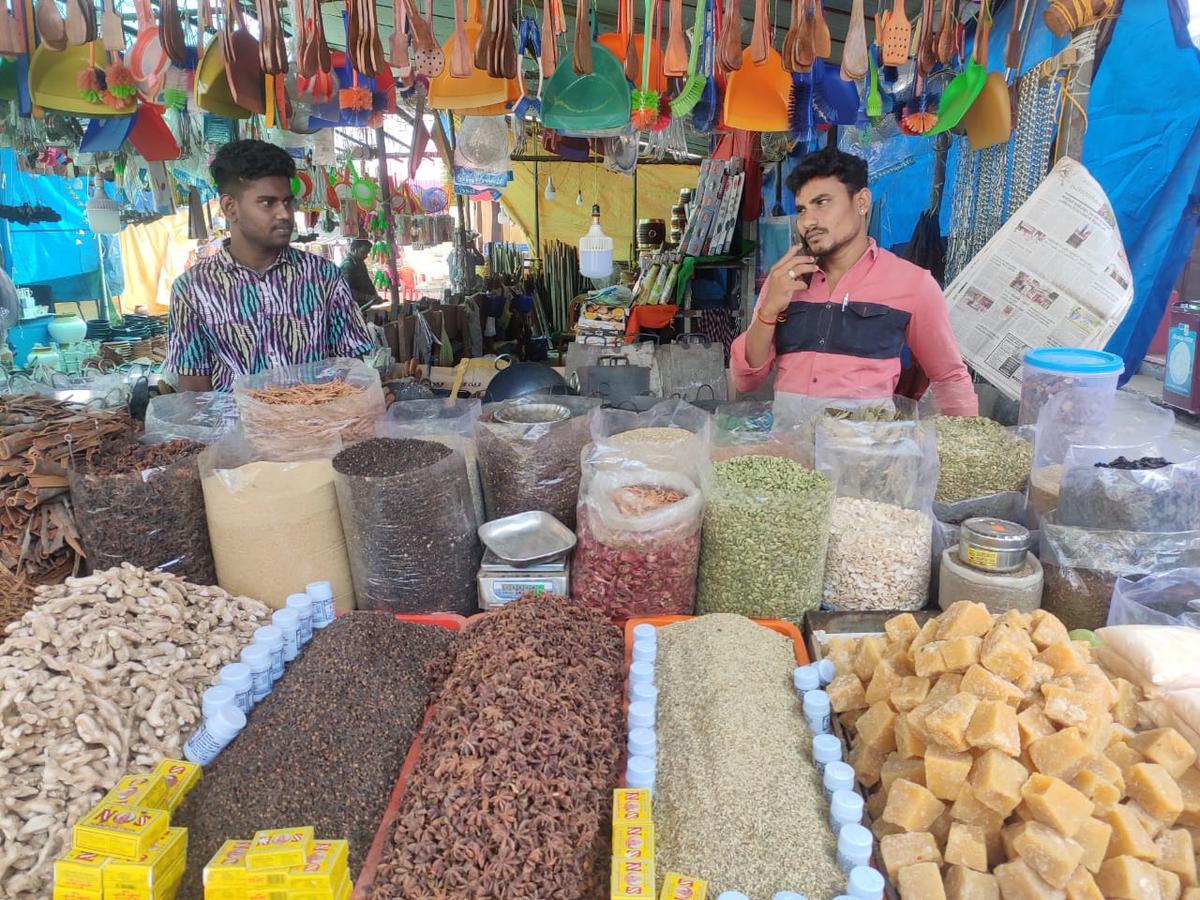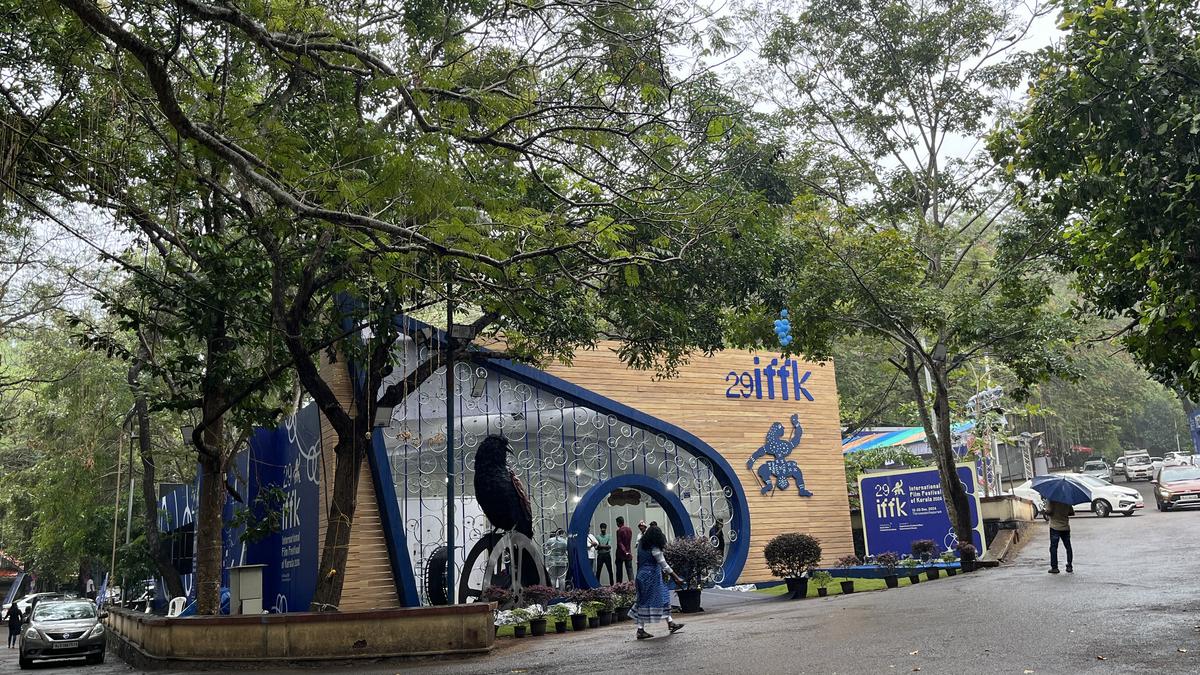Tubers in myriad shapes, colours and size fill up every available space at Omalloor Krishi Vaibhavam market, just behind the panchayat office at Omalloor, about five kilometres from Pathanamthitta. It spills out of shops into sidewalks, alleys and streets. I seek the help of Gopalakrishnan, manning one of the outlets, to identify some of the tubers.
The abundance of tubers at Omalloor Krishi Vaibhavam market.
| Photo Credit:
SREEJITH R KUMAR
He reels off the names effortlessly in one breath. “Chena (yam), paal chembu and mutta chembu (two kinds of colocasia), kaachil (elephant foot yam), madhura kizhangu (sweet potato), valli kizhangu (white yam), nana kizhangu (lesser yam), koorkka (Chinese potato), manjal (turmeric), kooravu (arrowroot), inji (ginger), manga inji (mango ginger), kappa (tapioca)….”
Explaining the profusion of tubers in the market, Gopalakrishnan says that according to the agrarian calendar followed in Kerala, the Malayalam month of Kumbham (February-March) is when tubers are harvested and the season to plant a new crop. By Meenam (March-April) in the Malayalam calendar, farmers start buying planting material for the next season.
In addition to tubers, many of the shops have sacks filled with chips and chunks of something white, cream and yellow in colour. “These are sun-dried tapioca chips. Some are raw tapioca that have been chopped into slivers or small chunks and then dried in the sun. Some have been cooked and then chopped for drying. That explains the variations in colour,” he explains, adding that these could be used for cooking any time.
Agriculture Officer Smitha V says farmers from neighbouring districts of Kollam and Kottayam and even from Ernakulam and Idukki come to the market to get good quality tubers for planting.

Spices galore on sale at Omalloor Krishi Vaibhavam market in Pathanamthitta district
| Photo Credit:
Saraswathy Nagarajan
The pungent aroma of spices fills the air as sackfuls of Kerala’s famous spices are up for sale in some of the shops. Brothers Manikandan and Azhakeshan who are following in their father’s footsteps say the spices are sourced from Idukki. Cloves, nutmeg, cardamom, black pepper, stone mace, cinnamon, sesame seeds… They also have varieties of jaggery from sugarcane and palm, including palm jaggery blended with dried ginger to make chukku kaapi (a beverage made with the jaggery).
Inside the market, it is the abundance of agricultural produce, implements for farming, black and red pots in myriad shapes for cooking, reed baskets, planting material, saplings, organic potting material etc that catch the eye. Also on sale are grinding stones, wooden para (traditional measure used to measure grains), wooden stopper used to drain rice, etc. What is interesting is that most of it is handmade. Yes, there are not-very-pretty plastic winnowing baskets and baskets too in addition to the usual collection of garments and accessories. All the traders camp here till the one-month fair concludes.
Knives, machetes, sickles and metal heads to make different farm implements.
| Photo Credit:
SREEJITH R KUMAR
Shovels, spades, pickaxes, forks, a plethora of knives with blades in various lengths and widths… everything that one would need in a farm is here for sale.
Rajan K is busy hammering and fixing the blade of a shovel to a long wooden handle. Looking up from his work, he merely nods his head to indicate that he has been coming for the annual fair for several years. “Sales are good as many farmers visit this market. The heat has been a dampener this year. But in the evening, it is packed with customers,” he says.
Agreeing with him, the person at the counter says there is brisk sale of handmade iron knives, kitchen knives, machetes, sickles, daggers etc for different purposes.
Uruli, a wide-mouthed vessel used for cooking, lamps and containers in brass and bell metal come from neighbouring Maanar in Alappuzha district.
Uruli in brass and bell metal for sale at the Omalloor Krishi Vaibhavam in Pathanamthitta district.
| Photo Credit:
SREEJITH R KUMAR
Showing the uruli and traditional lamps that come in many dimensions, Abdul Razak, says he has been a regular for the last four decades. To cater to customers, he also stocks the usual woks, vessels and household utensils in aluminium and steel.
Saplings of jackfruit and banana for sale.
| Photo Credit:
SREEJITH R KUMAR
Seeds of both vegetables and flowering plants, saplings of new varieties of jackfruit, mango, coconut and so on are available for sale.
One of the oldest agrarian fairs in Kerala and largest in Southern Kerala, the Omalloor Krishi Vaibhavam, once known as the Omalloor Vayal Vaibhavam, is supposed to be have been in existence for more than 800 years. Its origins are steeped in folklore and oral history.
Muraleedharan Thazhakkara, who used to host ‘Vayalum Veedum’, a popular agriculture-based programme on Akashvani, Thiruvananthapuram, narrates the story behind the fair. He says the fair is part of an agrarian culture. He explains that in those days, no paddy cultivation was possible without bulls to till the land and bullock carts were the major mode of transportation.
The story goes that a bull tethered to a pala (Blackboard tree) near the Sreerama Swami temple, near Thekkevayal at Velinelloor panchayat in Kollam, managed to break free with a branch of the tree still attached to the rope that had tethered it. No one wanted to try and stop the massive bull on the run. When it reached Omalloor, nearly 65-plus kilometres away, a brave farmer managed to stop it and tether it. “Legend has it that the person who managed to nab the runway bull was none other than the presiding deity at Sree Rama Swamy Temple at Omalloor. The story goes that the branch of the pala entangled in the rope grew into a tree and the field became the location of an agrarian fair, especially a large cattle fair that was also held with it,” narrates the former broadcaster.
Since, then it has been an annual fair, attracting cattle dealers and farmers from all over Kerala and Tamil Nadu. “In addition to cattle, different kinds of handspun rope to tether the cattle was also sold. It was the cattle fair that led to the beginning of the agrarian fair,” he adds.
File picture of a cattle fair at Omalloor Krishi Vaibhavam, the biggest agrarian fair in South Kerala.
Till about 50 years ago, two kinds of bullocks used to be brought to the cattle fair — those for ploughing and for drawing bullock carts. “The ringing of the bells tied to the animals’ necks announced to the folks in Omaloour that the cattle had started arriving for the fair. Before the existence of loudpseakers, this served as an announcement for the fair,” explains Muraleedharan.
With the decline in paddy cultivation and the introduction of modern farming implements, cattle for ploughing no longer had much significance. Bullock carts for transportation of men and goods have vanished almost completely.
“For the last many years, the cattle fair has been just in name. A couple of bulls from villages nearby are brought just to keep the legacy going. There isn’t much in cattle as such,” says Smitha as she takes us to the original venue of the fair just across the road from the present venue of the market.
Smitha T, Agricultural Officer of Krishi Bhavan, Omalloor.
| Photo Credit:
SREEJITH R KUMAR
A narrow, muddy road leads to an expanse of land that were once paddy fields. The pala, around which the fair had sprung up, was uprooted during the 2018 flood. Now, a kanjiram (Poison nut tree) grows in its place.
“For the last two decades, the panchayats took the initiative to keep alive the legacy. A delegation led by panchayat officials from Omalloor visits Velinelloor panchayat to invite them to the fair.
Muraleedharan points out that it was an excellent decision of the authorities to keep alive the legacy of the fair by transforming it into an agrarian fair when the significance of the cattle fair dwindled.
Now, the district panchayat and the State agriculture department cooperate to continue the legacy of the fair. “On the first day of the Malayalam month of Meenam, a lamp is brought from the temple at Velinelloor in a procession led by the panchayat authorities. It is received with great fanfare and the lamp is taken in a procession to the base of the tree where it all began hundreds of years ago,” says Smitha.
Stall of the Omalloor Karshika Karma Sena selling bio-pharmacy products.
| Photo Credit:
SREEJITH R KUMAR
Under her leadership, a seven-member Karshika Karma Sena compost organic fertilisers and manure. They also sell saplings, flower pots and planting material in a makeshift counter outside the Agriculture Extension Office inside the market.
In the evening, concerts and cultural programmes are held on the makeshift stage that comes up for the fair.
The fair concludes on the last day of the month of Meenam and the traders and farmers leave the venue. And for the local traders and farmers, it is back to business as usual till the arrival of Meenam next year.
“In the era of online buyers and sellers, these fairs are a wonderful way of bridging the past and the present and in connecting the farmers and the buyers. Moreover, it is also a powerful reminder of our roots,” believes Muraleedharan.





